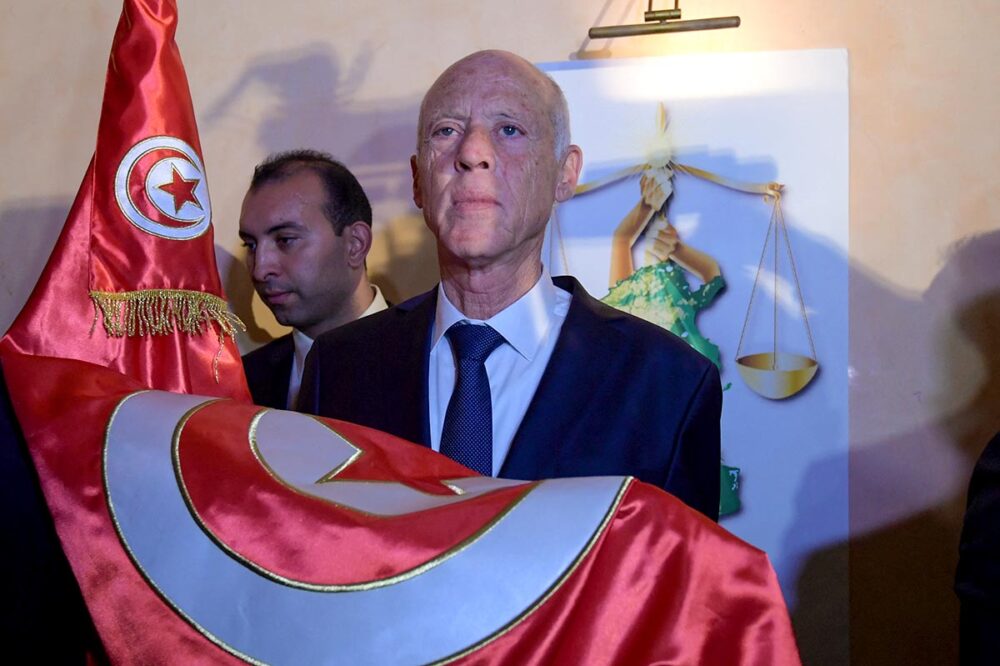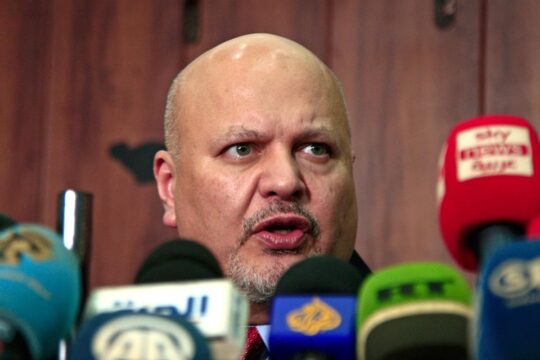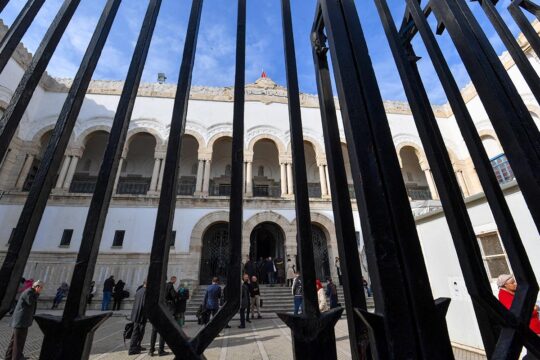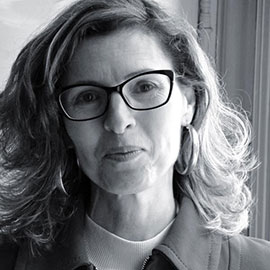"Among Arab nations, Tunisia stands out for its ability to provide real support for Palestine, rather than just empty rhetoric. Tunisia is one of the few Arab countries -- along with Palestine and Jordan -- to have signed the Rome Statute of the International Criminal Court (ICC). So it could have joined South Africa, Bangladesh, Bolivia, the Comoros and Djibouti in their request to the ICC prosecutor [on November 17] to open an investigation into Israeli crimes in Gaza."
This was how renowned Tunisian mathematician Ahmed Abbes expressed his incomprehension on November 23 on his Facebook page. Abbes, a research director at the CNRS in Paris, is known for his activism in support of the Palestinian cause. He is secretary of the Association of Academics for the Respect of International Law in Palestine, an organisation based in France. "Since the Algerian War, there has always been a hard core of French mathematicians committed to just causes, and to Palestine in particular. There are many points of contact between law and mathematics: rationality, method and a sense of how to argue," explains the researcher.
Government stays silent
Abbes' post very quickly turned into a petition, as the Israeli army's bombardment of Gaza intensified and the war between Hamas and Israel that started on October 7 claimed many civilian lives. The petition was published on December 5 when, according to Hamas, the death toll in Gaza had risen to 16,248, over 70% of whom were women and children. The petition mobilised a group of academics in Tunisia, who circulated it among public figures and NGOs. The text, written in Arabic, calls on the authorities to "officially refer the matter to the ICC Prosecutor requesting he open an investigation into the crimes of genocide and ethnic cleansing perpetrated by Israeli settlers over the past 75 years. These crimes have increased dramatically since October 7, 2023".
Although Palestinian ambassador to Tunisia Hayel Al-Fahoum welcomed this initiative on December 13, it did not elicit any reaction from the Tunisian government. The authorities have remained silent on the actions, protests and requests of local NGOs, which it has labelled "corrupt", "sold out to foreigners" and even "close to the Zionist movement" since President Kaïs Saïed's coup de force on 25 July 2021 and his seizure of full powers.
“Total support” for the Palestinian cause
Since October7, Saïed has repeatedly expressed in fiery speeches his country's total and unconditional support for the Palestinian resistance, going so far as to break with the "two-state solution" usually defended in Tunisia. And never before has Foreign Minister Nabil Ammar made so many declarations around the world, summit after summit, in favour of "Tunisia's firm and unchanging position on the legitimate and immutable rights of the Palestinian people".
But two and a half months after the start of this war, and while the images show Gaza in ruins, Tunisia is still not seizing the opportunity offered by the ICC to symbolically come to the aid of "brotherly and friendly people", to use its own words. This is "incomprehensible" to Abbes, who continues to follow from afar the progress of the petition- It has so far been endorsed by 101 prominent figures and a dozen NGOs.
First Arab judge at the ICC
Does Tunisia not trust the ICC, which several developing countries accuse of "double standards" for prosecuting war criminals from African countries and ignoring those from the North? This hypothesis does not seem valid given the way Saïed's diplomacy has mobilised to get Tunisian judge Haykel Ben Mahfoudh elected to the court in The Hague. Following the Assembly of States Parties in New York, Ben Mahfoudh became the first Arab judge to sit at the ICC.
"This success is recognition of the Tunisian candidate’s high calibre. It is also the fruit of an election campaign that lasted several months in Tunisia and abroad, and to which the Ministry of Foreign Affairs and its diplomatic and permanent missions abroad devoted themselves (...) under the impetus of the country's senior authorities," says the foreign affairs ministry in a December 6 statement.
But the contradiction is also evident in official reactions to the ongoing war. On October 27, against all expectations, Tunisia abstained from voting for a United Nations General Assembly resolution calling for a humanitarian ceasefire in Gaza. But on December 12 it changed its position and this time voted in favour of the same ceasefire call. At the same time, Tunisia on November 12 expressed reservations about most provisions in a Resolution of the Extraordinary Arab-Islamic Summit held in Riyadh in support of Palestine -- including one calling for recourse to the ICC!
"We are not ruling out any option"
"We are not ruling out any option that would enable the Palestinian people to regain their rights,” said foreign affairs ministry communications director Mohamed Trabelsi when Justice Info asked about the reasons for this reluctance. "Our current priority is an immediate ceasefire. We are working to pursue this objective through our diplomatic and political channels. To this end, the Minister of Foreign Affairs continues to hold bilateral talks with the heads of diplomacy of brotherly and friendly countries. Secondly, communication is an essential part of our strategy: we need to focus on the real cause of the conflict. It's a question of colonisation, which we condemn and call a crime."
Tunisia is up to its neck in debt and dependent on blocs considered to be Israel's allies, such as the United States and Europe. According to some analysts, this economic fragility could explain why the authorities have not resorted to international criminal justice. Hatem M'rad, a professor of political science at El Manar University in Tunis, believes “that would be considered an insolent act".
And while the diplomats stall, virulent official rhetoric led by Saied is probably intended more for "internal consumption", thinks a former Tunisian foreign minister wishing not to be named in view of arrests of government critics in the past year. This rhetoric is in tune with the emotions and passions of the crowds, who took to the streets as soon as the bombing of Gaza began. It has been accompanied by Tunisia sending several trucks of humanitarian aid and receiving some of the wounded in Tunisian hospitals.
Tunisia's position on an ICC referral may not be definitive. "A new group of countries is preparing to refer Palestine to the ICC. We would like Tunisia to join them," says Shawan Jabarin, director of Palestinian human rights organisation Al-Haq.
On December 6, former head of the Tunisian National Bar Association Chawki Tabib said on Facebook that the Palestinian Bar Association had asked him to seize the ICC. He has filed a communication to the ICC on alleged war crimes committed by 19 Israeli political and security officials. Tabib points out that under Article 13 of the Rome Statute (ICC founding treaty), only States Parties (ICC member states) or the UN Security Council may "refer" cases to the ICC. But for the group he represents, this communication represents a "duty of conscience".
"We want to confront the court in The Hague with its legal, moral and political responsibilities,” Tabib said on December 9 on Palestinian radio station Sawt Falastin, “so that we, as Arabs and Palestinians, are not one day reproached for having remained silent and not considered this legal alternative to a humanitarian tragedy that is still unfolding before our very eyes."








